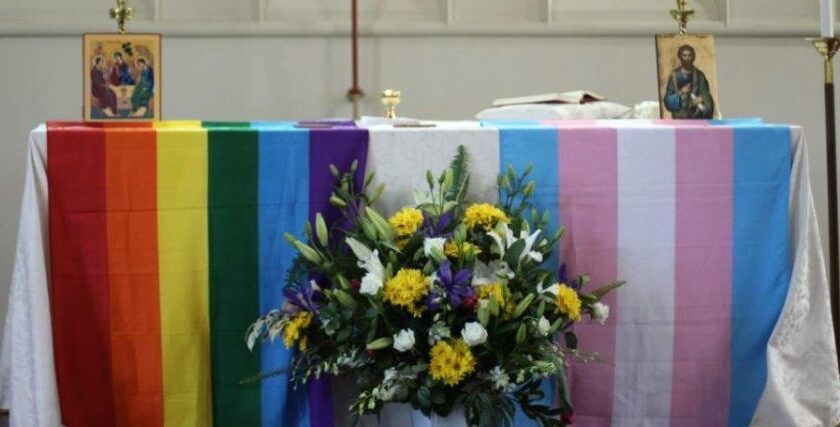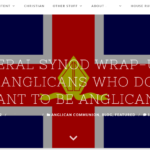By the Revd Dr Josephine Inkpin, an Anglican priest and transgender woman,
currently serving as Minister of Pitt Street Uniting Church in Sydney
At this time we have a wonderful invitation to church and world to understand, support, and celebrate gender diversity as one of the many gifts of God in our glorious human diversity.
Like any other human ‘difference’, gender diversity can often be misunderstood and ignored, but it is part of God’s Pentecostal outpouring of human variety in an intended rainbow tapestry of love – or as I like to call it (especially as lives, identities and understandings shift over time) a revealing of the kaleidoscopic love which is God.
Anglican theological method and celebrating gender identity
Theologically and ecclesiologically speaking, Anglicanism should be able to handle gender diversity better than most. For Anglicanism is in so many ways a ‘non-binary’ religious expression: neither, for instance, simply Catholic nor Reformed, but encompassing both, in different ways, and many other tensions and paradoxes, and always with an openness (in its best formations) to mystery at the heart of being.
Anglicans are also always called to look afresh at scripture, tradition and reason, in dialogue with one another:
Today, in this respect, today’s scholarship shows the Bible to be even more multi-layered and interestingly diverse than ever, with gender diverse people enriching our understanding every day as they/we see things with our eyes and experience that others have not – just as women and black people have widened what white men’s eyes have seen in the past.
Words such as ‘being born again’, dying to the old self, and all those trans words (transfiguration, transformation etc) come alive again in new ways. We value outsiders we have neglected – like the extraordinary eunuchs of the Bible. We rejoice to reaffirm the truths that God looks not on the outside but at the heart, that love (and crucially loving all of ourselves as we have been created) is the heart of Jesus’ teaching, and that the test is whether fruits of the Spirit are seen in a life (which they manifestly are in gender diverse lives – peace, joy, etc – when they/we can live authentically).
Tradition is also full of wonderful diversity and we should be wary that very modern assumptions are not read into it – about, for example, gender distinction, which was viewed very differently in the past than in recent times.
Reason meanwhile is called to hear from the best of experience – above all the lived experience of gender diverse people – and medical and other support knowledge and research, which so clearly now affirms best practice of care and affirmation of gender diverse people for everyone to greet and follow.
Transgender experience and emerging leadership
Transgender people like myself are not huge in number (increasing in visibility but only as we have been so long hidden) but we are everywhere and gender diversity has always been with us – as biologists and other scientists show us in the natural world, and as history and the Bible also attest. We are found in all cultures. Indeed, in Australia the highest proportion of trans people is indeed among Tiwi Islanders. Whilst issues exist elsewhere, it is primarily Western culture (including Christian mis-directions) which has shaped things particularly badly. Research shows again and again that repressing us only hurts us – look, not least, at the staggering figures for self-harm among trans teenagers – and affirmation and celebration richly strengthens families, churches and wider communities.
Sadly, many in some Churches are jumping on a recent bandwagon which has tried to stop gender diverse liberation but the effect will only be to make such Churches look even more bigoted and backward than they already appear – a disaster for Christian mission as well as care. In contrast, parts of the Anglican Communion have already helped lead the way in showing other Churches that affirming transgender people at all levels is, or will be. so efficacious to everyone. Church responses are patchy. We now thankfully have a first bishop who is transgender (Meg Rohrer) in the Lutheran Church in the USA, but Lutherans are not positive everywhere officially. As on some other things, the Episcopal Church in the USA helps lead Anglicans into healthier pathways but the GAFCON network in particular is hostile. In some countries, like Australia, the Anglican Church is deeply split – with a very strong anti-trans movement and policies in very rich and powerful places in the diocese of Sydney, but willingness elsewhere to grow and learn. The wider positive work within the Anglican Communion can therefore offer support for Australians as we move forward.
My experience of emerging as a priest who is transgender
For myself, as an English-born and ordained priest, the first transgender priest coming out in the Church of England, in 2000, was wonderful to experience. If I had stayed in England, I would likely also have affirmed my own gender identity properly in the following years. It has not always been easy but the first trans priests like Carol Stone are true Anglican pioneer heroes – and they modelled how trans people are such good priests (perhaps as we know about personal suffering and experiencing God in darkness and finding new life).
Other pioneers – not least the Revd Dr Christina (Tina) Beardsley (do check out her wonderful books of help to churches!) – have nurtured, taught and enlightened others.
Canon Rachael Mann is but one of other English examples of someone who has shown how trans people have great gifts and enrich the Church at every level into which they are received warmly. It is disappointing that the Church of England also still has opposition within it to trans people, but General Synod positive resolutions, some bishops’ regulations and other measures have shown a growing acceptance. We hope for more.
My English background was very helpful in my coming out in July 2017 as the first openly trans priest in Australia – as I had the support of the Sibyls (UK based) support group (which has done and continues to do such great work) and, not least, Tina Beardsley’s guidance and friendship. It was however a step into the unknown and I did not know if I would lose my job, my priests orders, or my home and wife’s job (she is also an Anglican priest). I was blessed by being in the diocese of Brisbane where so many people were supportive – including bishops on a personal level (though they were understandably concerned about backlash and possible actions by reactionaries in Sydney and their allies). I was very warmly received by my fellow college staff, almost all of my theological college students, and rapturously so by the parish to which I belonged. I therefore served happily on many levels as a priest for four years in Brisbane, where best practice care for trans students was agreed in our local Anglican Schools network, much education took place, and a second trans priest came out (as rector of a parish) in 2020. I was even elected by the Brisbane diocese to General Synod in Australia – which was a great signal of the support I and trans people had in so many quarters there. In addition, another trans priest in another State in Australia eventually managed to receive a license to officiate.
Anglican transgender challenges in Australia
The Anglican Church in Australia has a number of changes of attitude and practice to make in regard to transgender people. LGBTIQ+ Anglicans were (and still are) in general left out of discussions about us (particularly at high decision-making levels), but this is especially so in relation to gender diverse and intersex people. Indeed, old-fashioned language such as ‘same sex’ marriage is still used, even by allies, in relation to issues of marriage, which strongly impact upon both gender diverse and intersex people and about which we have many things to share to enrich understanding. There is still no obvious Anglican process in Australia of how to move forward, unlike the imperfect and painful education and awareness which the Church of England’s Living in Life and Faithfulness has attempted to offer. The status of transgender priests (even if not married to a person of the same gender) is not assured in the same way as it is in England (and even better elsewhere in parts of the Anglican Communion.). The block on marriage equality in the Anglican Church also produces great soul-weariness, especially when Anglicans cannot celebrate amazing loving relationships of many gender diverse people.
Creating new space
All the above considerations never stopped me trying to keep raising awareness, supporting trans people in such need who are so easily alienated from churches, and making small changes where I could within the Anglican Church of Australia. I also remain in good standing with friends in the Anglican Church throughout Australia and have even preached and spoken in the Cathedral in Brisbane since I moved. I have not disowned my Anglican culture and I will never be likely to do so. For at its liberal catholic, open, generous, best, it has made me who I am, kept me alive during dark times, and continues in many places to be light for the world. However, towards the end of 2021, I was offered a call to Pitt Street Uniting Church in the very centre of Sydney – a progressive faith community which has a rich history of pioneer and prophetic leadership, creative prayer and action, and is one of the most celebratory churches towards LGBTIQ+ people in Australia. In becoming its Minister, I also became the very first openly trans person to be licensed (as distinct from allowed to stay in a job) to a mainstream Church in Australia and that is an important milestone. In my view, affirmation of LGBTIQ+ people by Churches is so long overdue – the theology and stories are all there if people want to look properly – and the time is urgent for us to move forward. Where I now serve offers me the opportunity to develop rather often mainly defend, to create and help people celebrate rather than simply to care for people who have been wounded when they don’t need to be, and to be able to empower others. I hope that that also strengthens and contributes to Anglican and other growth of understanding and celebration. Unlike parts of the Anglican Communion, the Uniting Church also does not have much of a history of understanding trans people but it is not hostile (except in a few quarters) and, in principle, ‘inclusion’ and ‘diversity’ are key shared Uniting Church values unlike the somewhat patchy approach in the Anglican Church. Crucially, even if I was a cisgender woman, I also could not be a priest in Sydney diocese, from whom most male priests in the Brisbane diocese would also be excluded on very conservative ‘Reformed’ grounds. I therefore currently function as an ecclesiastical ‘dual citizen’, open to the fresh movement of the Holy Spirit in, between, and beyond our existing Australian Church patterns (all of which need transformation and renewal with life from the margins).
As a co-chair of the national network Equal Voices, I work closely with other LGBTIQ+ Christians and allies across the Churches and hope that more people will come to see the light and celebrate the wonderful gifts which gender, and sexual, diverse, people offer to our Church and world. I know that Anglicans in many places across the world will continue to move, including in Australia – and I hope more quickly and joyfully!



